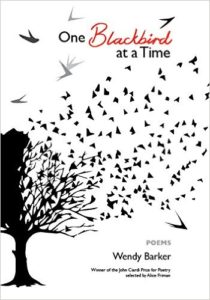One Blackbird at a Time by Wendy Barker. Kansas City: BkMk Press, 2015. 78 pages. $13.95, paper.
In this collection, Wendy Barker takes us on a journey through eyes of a teacher, exploring all the complexities of what it means to simultaneously be a poet, educator, woman, and bibliophile. Each poem presents a speaker who filters her world through the work of Emily Dickinson, Elizabeth Bishop, William Carlos Williams, Robert Frost, and many, many more. The literary worlds of the page and of the past imprint on the speaker’s world of today, not just in the classroom but also in the seemingly mundane tasks of everyday life.
In “Books, Bath Towels, and Beyond,” the speaker reflects on teaching “Song of Myself” and the ambivalence it brings:
[T]his time—not even Gary—grumbled about
Whitman’s disgusting ego, and yet when we came to
the place
where God is a “loving bedfellow”
who leaves “baskets covered with white towels
bulging the house with their plenty,” I was the one
who
wanted to stop.
The speaker continues to ponder how towels could be like a god. A lover, yes, the speaker asserts. But a god? It is not until the speaker traipses from classroom to the cleaning sprees of her mother, to Hawthorne’s Phoebe, to divorce, and finally to a new marriage and home, that she is led to the department store to buy towels. There, standing in line to pay, the image of Whitman returns:
And as I
pulled out my MasterCard to pay for the contents
of my brimming cart, a gaunt, wizen man entered
the check-out line, hands pressing
to his chest two white towels just like mine,
eyes lifted to the ceiling as if in prayer. I doubt that
Gary
would think it normal to greet the divine
while clutching terry cloth. But now I see
that Whitman knew what fresh towels could mean
for a dazed
and puffy face, white towels unspeckled by blood
or errant coils of hair, towels that spill from a basket
like sea-foam.
This poem, like the rest in Barker’s collection, details how for the lover of literature, not just the teacher, that poetry and the novel do not separate from life. As the speaker remarks in “Rereading The Golden Bowl,” “We live our lives through objects.” The poem or the book always begins as physical object—something to be picked up, handled, and consumed—but yet it is more. Barker’s collection flirts with some elements of magical contagion, that everything we’ve come in contact with in the past will stay with us in some form or fashion for the rest of our lives. For the speaker, poems express our being and our very being expresses poems. This is concept eloquently arises aptly in the homage to Bishop in “About That ‘One Art’”:
It’s a perfect poem, I say, and though no one
in the class is over twenty-five,
everybody
nods. They’ve all lost: the Madame
Alexander doll fallen into the toilet, silky
hair never the same, the friend who
moved away to Dallas, a brother once
again
in juvie.
The speaker continues to list what has been lost over the years: photo albums, people, breasts and husbands to cancer, etc. The poem concludes as she asks the class why Bishop wrote the poem as a villanelle:
… [S]o we
parse the form, say how such echoing
slows us, keeps us focused on each single
disappearance, so at first we hear lightheartedness,
a witty irony—but then the sounds grow
vaster, catch us off guard. And quicken.
This collection is not simply about teaching literature: it is about living literature. The words come from the lives we live, and as we live it is the words that keep coming back to us. Every poem in Barker’s collection exemplifies the inherent connectivity and the art of all the loves and losses that arise. One Blackbird at a Time is a map of influence, a capsule of memories, a personal canon, and love letter. You would be remiss not to take the tour.
—Trista Edwards, University of North Texas

